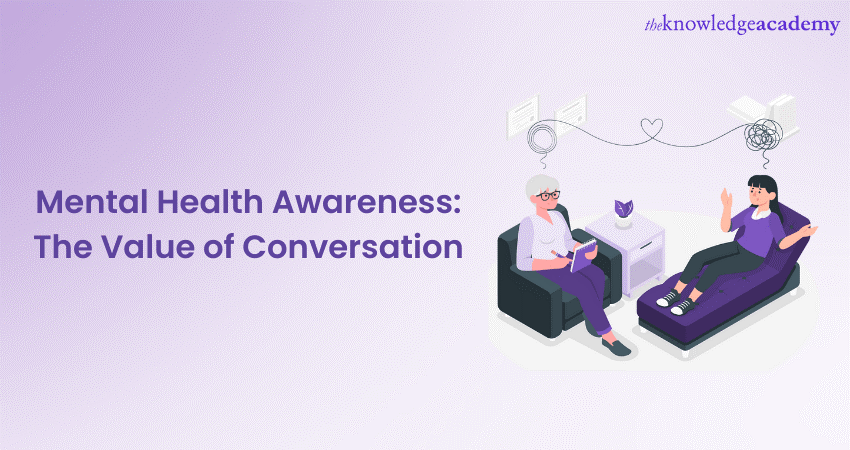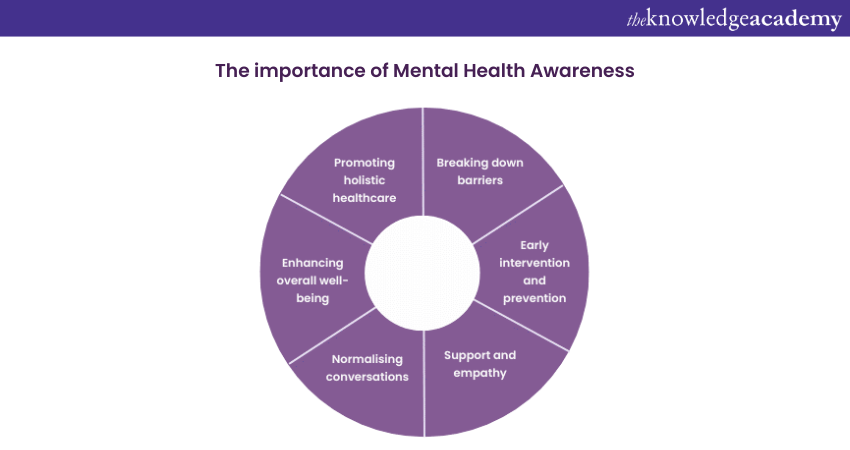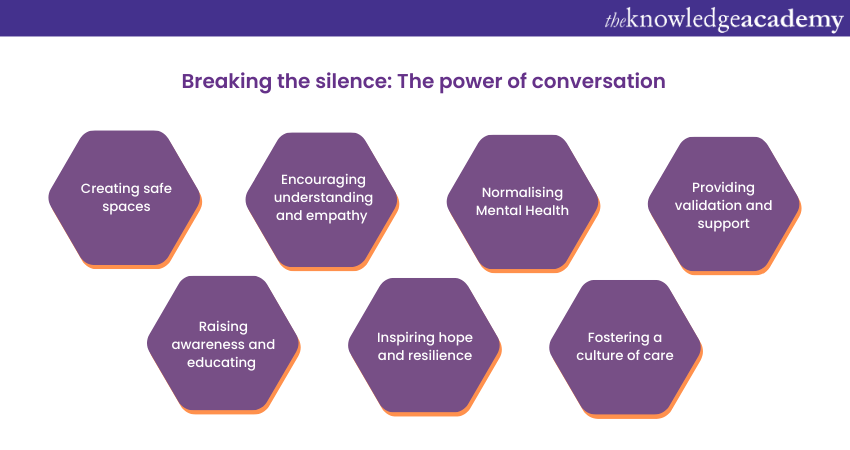We may not have the course you’re looking for. If you enquire or give us a call on +47 80010068 and speak to our training experts, we may still be able to help with your training requirements.
Training Outcomes Within Your Budget!
We ensure quality, budget-alignment, and timely delivery by our expert instructors.

Our mind is a room full of words, thoughts and experiences that remain unspoken and can either empower or cripple us. While the concept of Mental Health is clouded with judgement and labels, it serves as a crucial aspect of our wellness.Keep reading to gain insights into the importance of Mental Health Awareness. Also, learn about its positive impact on overall well-being. Discover effective strategies to manage stress.
In terms of Mental Health, the world has moved backwards, particularly after the hard-hit of 2019 pandemic. According to the Lancet Journal, the number of anxiety (25%) and depressive disorders (28%) grew tremendously from 2019 to 2023.
But this is high time the world starts addressing the disregarded aspect of well-being: Mental Health. Don’t know how to address this least talked about aspect of our lives? Don’t worry, this blog is here for you. Sometimes, the thoughts can become so overwhelming that they can lead to anxiety, depression and other mental/physical disorders. This is why Mental Health Awareness has gained utmost importance.
Table of Contents
1) What is Mental Health Awareness?
2) Understanding the stigma around Mental Health
3) The importance of Mental Health Awareness
4) Breaking the silence: The power of conversation
5) Conclusion
What is Mental Health Awareness?
Mental Health Awareness refers to the understanding, recognition, and acceptance of the importance of mental well-being in individuals and society as a whole. It involves acknowledging that Mental Health is as crucial as physical health and that mental illnesses are real and can affect anyone. Being mentally healthy means having the ability to cope with the normal stresses of life, maintain fulfilling relationships, and make positive contributions to one's community.
Mental Health Awareness aims to eliminate the stigma and discrimination associated with Mental Health conditions, ensuring that individuals feel safe and supported when seeking help or discussing their struggles. Through awareness campaigns, educational initiatives, and advocacy, awareness initiatives strive to ensure that individuals receive the care, support, and resources they need to lead mentally healthy lives. It emphasises the importance of self-care, seeking professional help when necessary, and supporting others who may be facing Mental Health challenges.
Ultimately, Mental Health Awareness is a call to action, urging society to prioritize mental well-being, break down barriers, and develop a more inclusive and supportive environment for all. One way to contribute to this effort is by sharing and implementing Mental Health Tips, which can help individuals manage stress, build resilience, and maintain a healthy mind.

Understanding the stigma around Mental Health
The stigma surrounding Mental Health is a significant barrier that prevents open conversations and hinders individuals from seeking help. Here are some key reasons why this stigma exists:
a) Lack of knowledge: Many people have limited understanding and knowledge of Mental Health conditions, leading to misconceptions and stereotypes. This lack of knowledge perpetuates the stigma and creates an environment of fear and discrimination.
b) Negative societal attitudes: Society often attaches negative labels to individuals with Mental Health challenges, portraying them as weak, dangerous, or unpredictable. Such attitudes contribute to its stigmatisation and discourage individuals from seeking support.
c) Fear of being judged: The fear of being judged by others and facing social rejection prevents many people from openly discussing their Mental Health struggles. This fosters a climate of shame and secrecy, making individuals reluctant to share their experiences or seek help.
d) Cultural and religious beliefs: Some cultures view mental illness as a sign of personal weakness or as a punishment. This leads to stigmatisation and reluctance to seek treatment.
e) Media portrayal: The media often perpetuates negative stereotypes about Mental Health through sensationalism and inaccurate portrayals. This can further reinforce stigma, as media representations shape public perception and understanding.
f) Workplace discrimination: Employees may fear that disclosing their Mental Health challenges could result in discrimination, loss of opportunities, or even job loss. This fear can have detrimental effects on their well-being.
g) Self-stigma: Individuals experiencing Mental Health challenges may internalise the stigma, self-sabotaging themselves and feeling a sense of shame. This can hinder their recovery process and make it difficult for them to seek help or engage in conversations about Mental Health Illness.
Enhance psychological well-being and support Human Wellness with our Psychological Skills Training For Human Wellness Training Course.
The importance of Mental Health Awareness

Mental Health holds immense significance in promoting the well-being of individuals and society as a whole. Here are some of the key reasons why Mental Health is Important:
a) Breaking down barriers: By educating the public about the reality of mental illnesses, society can combat the stigma and discrimination that often prevent individuals from seeking help.
b) Early intervention and prevention: When people are aware of the reasons and symptoms of Mental Health challenges, they can recognise them and take appropriate action. This leads to timely treatment and improved outcomes. Further, it emphasises preventive measures, such as Stress Management and self-care, to maintain good mental well-being.
c) Support and empathy: Awareness fosters understanding and empathy towards individuals facing issues. It encourages a compassionate approach, reducing judgment and promoting support. When society is educated about Mental Health, it becomes easier for friends, family, and communities to provide the necessary emotional support and care.
d) Normalising conversations: Being aware encourages open dialogue, allowing individuals to discuss their struggles, share their experiences, and seek guidance. Normalising these conversations creates an environment where individuals feel comfortable reaching out for help without fear of being judged or labelled.
e) Enhancing overall well-being: Mental Health is an integral part of overall well-being. Therefore, when it is prioritised, and awareness is spread, it leads to improved quality of life for individuals. Furthermore, the awareness encourages self-reflection, self-care, and the adoption of healthy coping strategies.
f) Promoting holistic healthcare: The awareness helps recognise that Mental Health is interconnected with physical health and that addressing challenges is essential for overall wellness. Promoting awareness can contribute to a comprehensive healthcare system that addresses the needs of the person as a whole.
Breaking the silence: The power of conversation

Profound conversations connect us, allow us to express ourselves, and foster understanding. When it comes to Mental Health, conversations play a crucial role in breaking the silence and creating a supportive environment.
“Good conversation is the equivalent of shared emotion.” — Marty Rubin
But how do conversations do the magic? Why is conversing about Mental Health of utmost importance? What can be done to break the silence? Let’s discuss various strategies to navigate through Mental Health challenges and promote holistic mental wellness. Pursuing a Mental Health Career allows professionals to facilitate these crucial conversations, providing a safe space for individuals to share their experiences and seek support.
Creating safe spaces
Conversing creates safe spaces where individuals feel comfortable sharing their experiences and emotions. Active listening and non-judgmental support can create an environment that encourages openness and vulnerability. Safe spaces validate individuals’ struggles and promote a sense of belonging, reminding them that they are not alone.
Encouraging understanding and empathy
Engaging in conversations about Mental Health Issues helps bridge the gap in understanding. It allows individuals to gain insight into the challenges faced by those surviving with Mental Health issues. Sharing personal stories, experiences, and perspectives cultivate empathy and dismantles stereotypes. Deep conversations break down barriers, promoting acceptance and compassion.
Normalising Mental Health
Open conversations contribute to normalising Mental Health. Open discussions on mental well-being shift societal perceptions and break free from the stigma. It also helps reduce fear, shame, and isolation, empowering individuals to seek help and support without hesitation.
Providing validation and support
Individuals struggling with Mental Health challenges can be supported by talking about their mental illnesses. Simply being heard and understood can have a transformative effect. Further, engaging in heartfelt conversations allows us to provide emotional support, offer resources, and guide individuals towards professional help when needed. It also lets individuals know that their feelings are valid and that they are not alone in their journey.
Raising awareness and educating
Conversations are powerful tools for raising awareness and educating others about Mental Health. Sharing knowledge, dispelling myths, and providing accurate information can encourage individuals to make informed decisions about their mental well-being. Insightful conversations also reach beyond individual interactions, creating a significant impact and contributing to a more mindful and compassionate society.
Inspiring hope and resilience
Sharing stories of recovery and personal growth can uplift individuals who may be struggling emotionally. Further, highlighting the journeys of those who have overcome Mental Health challenges can also instil a sense of optimism and assurance. Such uplifting conversations become a beacon of hope, reminding individuals that recovery is indeed possible and that they have the strength to persevere.
Fostering a culture of compassion
When individuals actively engage in discussions, they signal that their mental well-being matters. Supportive conversations encourage proactive self-care, promote early intervention, and emphasise the importance of seeking professional help when needed. They remind us to prioritise Mental Health in our daily lives.
Conclusion
Destigmatising Mental Health is crucial for creating a society that values and supports the well-being of all individuals. Together, let us continue to advocate for Mental Health Awareness, challenge stigma, and create a future where everyone prioritises, celebrates, and embraces mental well-being.
Gain in-depth knowledge about major depressive disorders and their respective treatments. Register for our Mindfulness Training now







 Top Rated Course
Top Rated Course



 If you wish to make any changes to your course, please
If you wish to make any changes to your course, please


